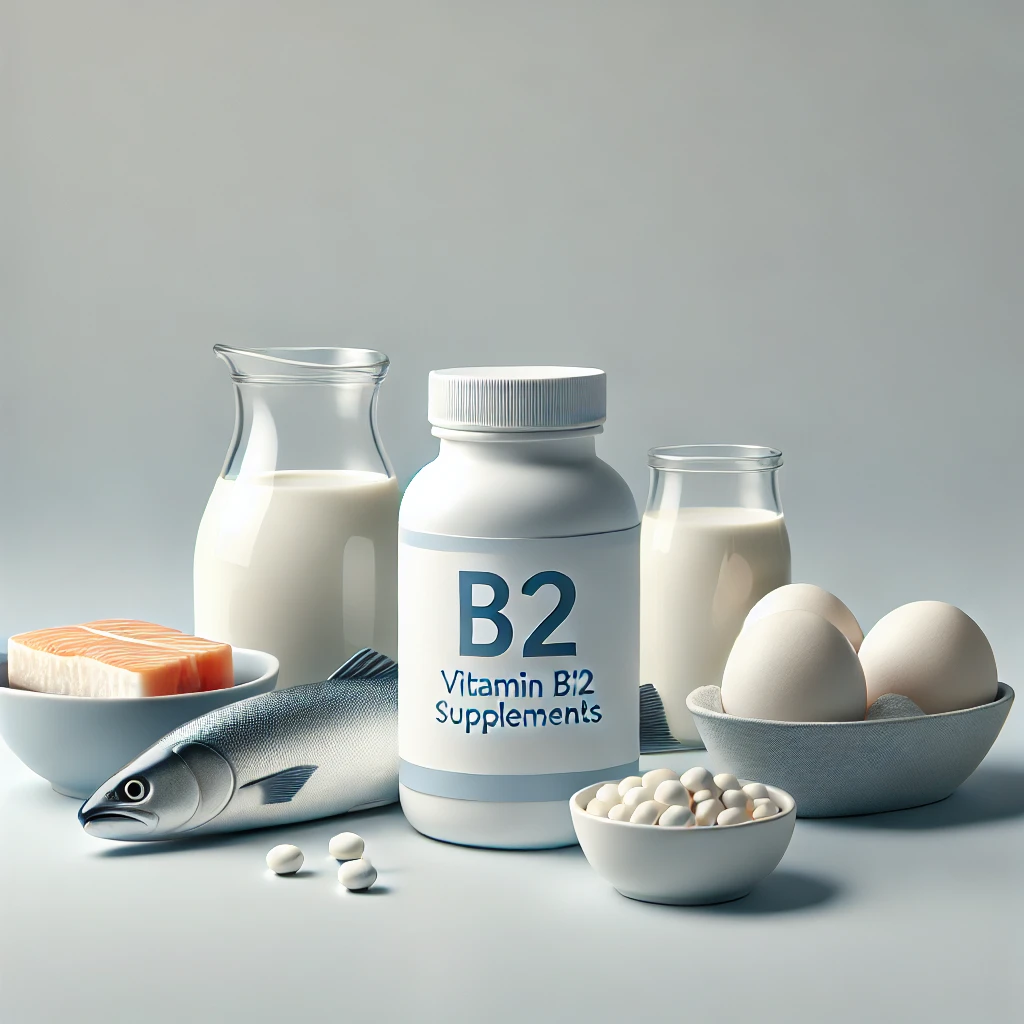If you have Polycystic Ovary Syndrome (PCOS), you may have experienced symptoms like fatigue, mood swings, or insulin resistance. One nutrient that can make a big difference in managing these symptoms is Vitamin B12. In this article, we’ll explore how Vitamin B12 can support your health, how to get enough of it, and practical tips for including it in your daily routine.
What Is Vitamin B12 and Why Is It Important?
Vitamin B12, also known as cobalamin, is a water-soluble vitamin that plays a critical role in a lot of bodily functions, including:
- Energy production: Helps your body convert food into fuel.
- Supporting your nervous system: Vital for mental clarity and emotional well-being.
- Red blood cell production: Prevents anemia and keeps you feeling energized.
- DNA synthesis: Important for cell growth and repair.
Vitamin B12 is mostly found in animal products, which can make it tricky for certain groups—like vegetarians, vegans, and those on medications like Metformin (often used for PCOS)—to get enough.
How Does Vitamin B12 Help Women with PCOS?
For women with PCOS, Vitamin B12 can help address some of the most common symptoms, including:
1. Improved Energy Levels
Fatigue is one of the most frustrating symptoms of PCOS, often caused by hormonal imbalances and insulin resistance. Vitamin B12 helps your body produce red blood cells and convert food into energy, which can give you a significant boost when you’re feeling drained.
2. Better Insulin Sensitivity
PCOS is closely linked with insulin resistance, where your body has trouble using insulin effectively. Studies suggest that Vitamin B12—especially when combined with Metformin—can improve insulin sensitivity, making it easier for your body to manage blood sugar levels.
3. Supporting Mental Health
Hormonal fluctuations in PCOS can contribute to mood swings, anxiety, and even depression. Vitamin B12 is essential for maintaining your nervous system’s health, which can help stabilize your mood and reduce stress.
4. Preventing Deficiency from Metformin
If you’re taking Metformin for PCOS, it can lower your body’s ability to absorb Vitamin B12. Over time, this can lead to a deficiency, which can cause symptoms like nerve damage or cognitive issues. Taking a Vitamin B12 supplement can prevent this from happening.
5. Promoting Healthy Skin and Hair
For women with PCOS, hair thinning and acne are common concerns. Vitamin B12 aids in cell regeneration, which can help improve skin health and promote stronger, healthier hair.
Signs You Might Be Deficient in Vitamin B12
If you’re not getting enough Vitamin B12, you might notice symptoms like:
- Persistent fatigue or weakness
- Numbness or tingling in your hands and feet
- Brain fog or memory problems
- Pale or yellowish skin
- Mood swings or irritability
- Difficulty breathing or heart palpitations
If any of these sound familiar, it might be time to talk to your doctor and get your Vitamin B12 levels tested.
How to Boost Your Vitamin B12 Intake
If you’re looking to increase your Vitamin B12 intake, here are a few ways to do it:
1. Eat More B12-Rich Foods
Vitamin B12 is naturally found in animal products, so try to include these in your meals:
- Meat: Beef, chicken, and turkey
- Fish: Salmon, tuna, trout, and sardines
- Dairy: Milk, yogurt, and cheese
- Eggs: Particularly the yolks
- Fortified Foods: Plant-based milks, cereals, and nutritional yeast (for vegans and vegetarians)
For a detailed list of B12-rich foods, you can check out the USDA’s FoodData Central.
2. Take Supplements if Needed
If you’re vegan, vegetarian, or taking Metformin, you may need to take a Vitamin B12 supplement. Supplements come in several forms, including:
- Oral tablets
- Sublingual drops (which you place under your tongue)
- Injections (for more severe deficiencies)
Before starting supplements, it’s always a good idea to talk to your doctor to figure out the right dosage.
3. Monitor Your Levels Regularly
Routine blood tests are a simple way to keep track of your Vitamin B12 levels and ensure you’re not deficient (or getting too much). Check with your doctor to schedule regular tests.
Practical Tips for Adding Vitamin B12 to Your Routine
- Plan Balanced Meals: Incorporate B12-rich foods into your meals. For example, try scrambled eggs with smoked salmon for breakfast or a fortified cereal with almond milk.
- Choose High-Quality Supplements: Look for well-reviewed brands that ensure proper absorption and safety.
- Stay Consistent: Whether through food or supplements, consistency is key to maintaining healthy Vitamin B12 levels.
Vitamin B12 in the Broader Picture of PCOS Management
While Vitamin B12 offers many benefits, it’s just one part of a larger strategy for managing PCOS. For the best results, consider these additional healthy habits:
- Exercise Regularly: Activities like walking, yoga, or strength training help improve insulin sensitivity and manage weight.
- Follow a Low-Glycemic Diet: Focus on whole grains, fresh vegetables, lean proteins, and healthy fats to stabilize blood sugar.
- Manage Stress: Stress can worsen PCOS symptoms, so try relaxation techniques like meditation, deep breathing, or yoga.
- Get Quality Sleep: Aim for 7-8 hours of restful sleep every night to help with hormonal regulation.
FAQs
1. Can I get too much Vitamin B12?
Vitamin B12 is water-soluble, meaning any excess is usually flushed out by your body. However, very high doses from supplements can sometimes cause side effects. Stick to the recommended daily dose unless your doctor advises otherwise.
2. How long does it take to feel the effects of Vitamin B12?
Many people notice a boost in energy and improved mood within a few weeks of consistent supplementation or dietary changes.
3. Is it safe to take Vitamin B12 during pregnancy?
Yes! Vitamin B12 is essential during pregnancy to support your baby’s brain and nervous system development. If you’re pregnant and have PCOS, talk to your doctor to ensure you’re taking the right amount.






One comment on “Can Vitamin B12 Help with PCOS?”